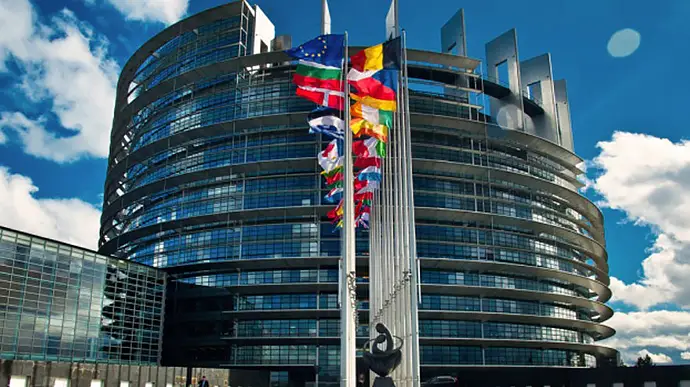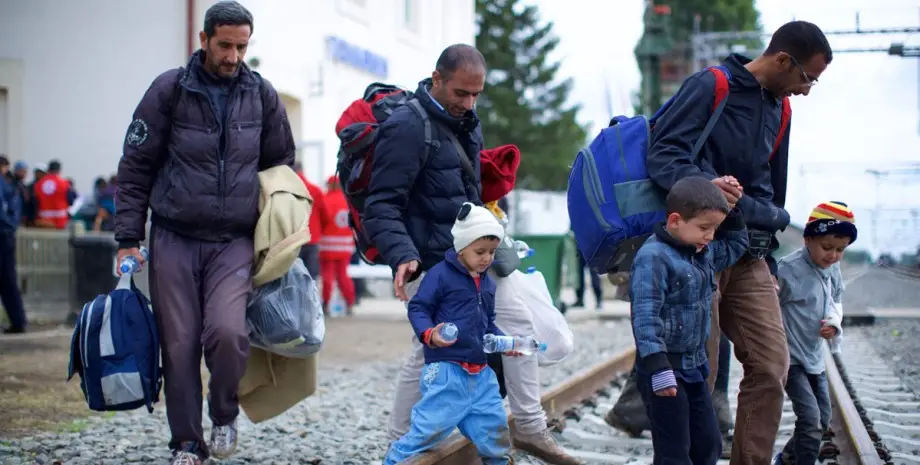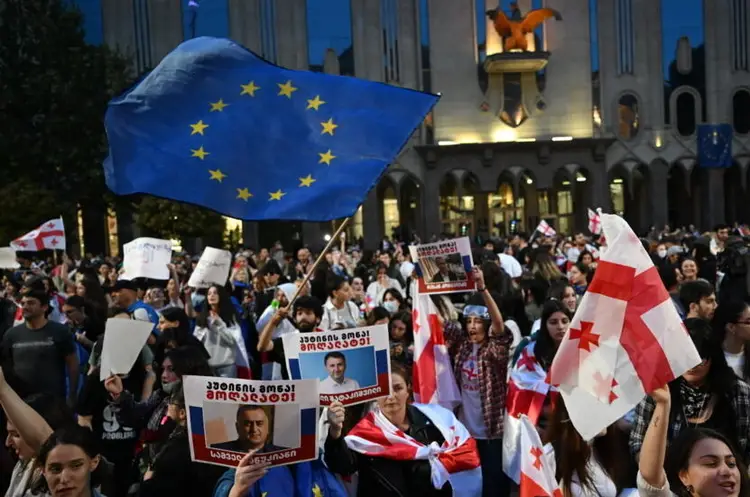Right-wing populists are growing in popularity in Europe: what to expect in the European Parliament elections?

The main catalysts for the "shift to the right" in the political views of Europeans were uncontrolled migration and a significant increase in crime
German Chancellor Olaf Scholz warned against threats from right-wing populists during a speech to a gathering of center-left European parties ahead of the European Parliament elections in June. Scholz was visiting Bucharest, the Romanian capital, for a conference of the Party of European Socialists, part of the group of Socialists and Democrats, the second largest in the European Parliament.
"Right-wing populists are actively campaigning against the idea of a united Europe. They are ready to destroy what we have built for future generations, stirring up negative sentiments towards refugees and minorities", the German leader said in a speech at the parliamentary building during the conference.
Opinion polls show a significant increase in support for the right in the upcoming European elections, and the radical right-wing group Identity and Democracy is likely to win enough seats to become the third-largest group in the European Parliament.
Scholz noted that a prosperous European Union that is "able to act" is "the best answer to populism and autocracy". He also emphasized his support for Ukraine and stressed that it is the key to "restoring peace in Europe".

Who are right-wing populists, and what is their ideology?
Right-wing populists are political forces or groups that espouse right-wing radical or conservative views and use populist methods to attract support. They usually emphasize nationalist or anti-immigration views and criticize traditional political elites and EU institutions. Right-wing populists may promote an "us versus them" mentality, advocate strict migration policies, anti-globalization and strong statehood. They often try to exploit instability and uncertainty among the population to attract support and influence EU policies.
The main ideas of right-wing populists:
Anti-immigration: Right-wing populists often advocate for limiting mass immigration and protecting borders to preserve cultural and national identity. For example, the Open Austria party in Austria campaigns for a reduction in the acceptance of refugees and immigrants.
Preservation of national values: Right-wing populists often advocate for the protection of traditional national values and cultural traditions. For example, the Party for Freedom in the Netherlands actively promotes the concept of "preserving national identity".
Departure from the European Union: Some right-wing populists advocate for their countries' withdrawal from the European Union or try to limit the EU's influence on internal affairs. For example, such parties in the UK actively supported Brexit and promoted maximum independence from the EU.
Strict migration policies: Right-wing populists advocate strict migration policies, such as deportation of illegal immigrants and increased border checks. For example, Hungarian Prime Minister Viktor Orbán actively pursues a policy of "border protection" and deploys border barriers to curb the flow of migrants.
Criticism of the European elite: The populist right often criticizes the policies and actions of the European elite, calling them distant from ordinary citizens and out of touch with reality. For example, Marine Le Pen, the leader of the National Front in France, accuses the European elite of ignoring the problems of the local population and underestimating national interests.

Problems with migration and related crime have become the main reasons for the popularity of such parties
In January, the Austrian Institute for Economic Research, EcoAustria has released a report claiming that migration has cost Austria €21.6 billion over 10 years. The researchers made calculations based on government revenues and expenditures from 2015, the beginning of the European migration crisis, to 2023, as well as financial forecasts for 2024-2025. The document takes into account migration-related revenues, such as taxes paid by employed migrants, which reduces the net cost of migration. However, according to Der Standard, only 45% of those granted asylum by 2022 — mostly people from Syria, Afghanistan, Somalia, Iraq, and Iran — are working and paying taxes. The general conclusion of the Austrian researchers is unequivocal: the costs of refugee migrants far exceed the income from them. By the way, Ukrainians were not taken into account in this study, as they have the status of displaced persons.
The findings of the Austrian institute are very similar to the results of a fundamental study by the School of Economics at the University of Amsterdam . The 2023 study, entitled "Borderless Welfare State: The Consequences of Immigration for Public Finances", found that the costs of immigration policy in the Netherlands averaged €17 billion per year, with a peak of €32 billion in 2016. In total, the cost of immigration for the country over 25 years amounted to approximately €400 billion.
Other European countries have not conducted such detailed studies. In particular, it is known that, for example, Germany spent approximately €48 billion on migrants in 2023. This amount includes the costs of reception, housing, migration registration, educational support for children and youth, as well as various social expenditures. It is also known that about 900,000 migrants-almost half of those who arrived in Germany during the 2015-2016 migration crisis-are still living on social benefits. However, the problems associated with illegal, uncontrolled migration have not only an economic aspect. Quiet, peaceful and safe European cities are becoming a thing of the past. It is common knowledge that mainstream media will avoid pointing out the link between crime and migrants. Police also often avoid publishing the nationality and origin of criminals. However, this often has the opposite effect, increasing distrust of the authorities or being exploited by right-wing populists.
A classic example of how uncontrolled migration can turn a safe and peaceful country into a battleground for criminal gangs is Sweden. The country, where one in five residents was born outside the country, is currently experiencing a surge in crime due to gang wars in which immigrants are massively involved. The country now has the highest level of gun violence in Europe. In September 2023 alone, 11 people were killed in gang shootings. The Swedish government was forced to bring in the army to restore order. And Prime Minister Ulf Kristersson blamed the violence on "irresponsible immigration policy and failed integration." In 2020, Swedish sociology professor Goran Adamson published a study of crime that demonstrates its connection to immigration. In the period from 2002 to 2017, 58% of crime suspects in Sweden were migrants. Migrants also committed 73% of murders and 70% of robberies in the country. In general, Adamson concluded in his study that the murder rate in Sweden has quadrupled due to immigration.
Experts from Denmark also confirm the relationship between immigration and crime. In 2020, the crime index in this country was 51% higher among immigrant men and 149% higher among male descendants of non-Western origin than among the total male population.
In 2018, The Wall Street Journal found that foreigners constitute a disproportionate share of crime suspects in Germany (34.7%). According to the Italian International Institute for Political Studies, in 2018, there were 59,655 inmates in Italian prisons, of whom 34% were foreigners, with the largest groups coming from Morocco (3,751), Albania (2,568), Romania (2,561), Tunisia (2,070), and Nigeria (1,453).
Some left-wing politicians consider the link between illegal migration and the rise in crime in Europe to be far-fetched and "a manifestation of racist prejudice". Other analysts point out that the prevalence of crime among migrants from certain regions is a consequence of their poor integration. Some also emphasize that non-Western migrants often arouse more suspicion among the police.

What to expect from the European Parliament elections?
The European Parliament elections will be held from June 6 to 9.
One of the changes they bring is that the head of the European Council, Charles Michel, has announced his participation in the European Parliament elections, so he will leave his post before his term expires in November 2024. In this case, until a new president is elected, the European Council may be temporarily chaired by the leader of the country that holds the EU presidency in the second half of 2024. This country is Hungary, and therefore Viktor Orbán.
It is expected that the far-right Eurosceptic parties belonging to the Identity and Democracy bloc, such as Matteo Salvini's Italian League, Alternative for Germany, Marine Le Pen's National Rally in France, and the Austrian Freedom Party, will strengthen their positions in the elections. Some of the members of this bloc have previously expressed sympathy for the russian leadership, and some still oppose assistance to Ukraine (Alternative for Germany, Austrian Freedom Party). However, there are also parties in this bloc that support Ukraine, such as Portugal's Chega "Enough."
However, the rise of the far right will not change the dominance of the traditional conservatives (the European People's Party) and the Social Democrats in the European Parliament.
According to the Europe Elects forecast, their forces will not suffer losses. Meanwhile, the Liberals (Renew Europe) and Greens factions may shrink after the elections. At the same time, Identity and Democracy may become the third-largest faction.












